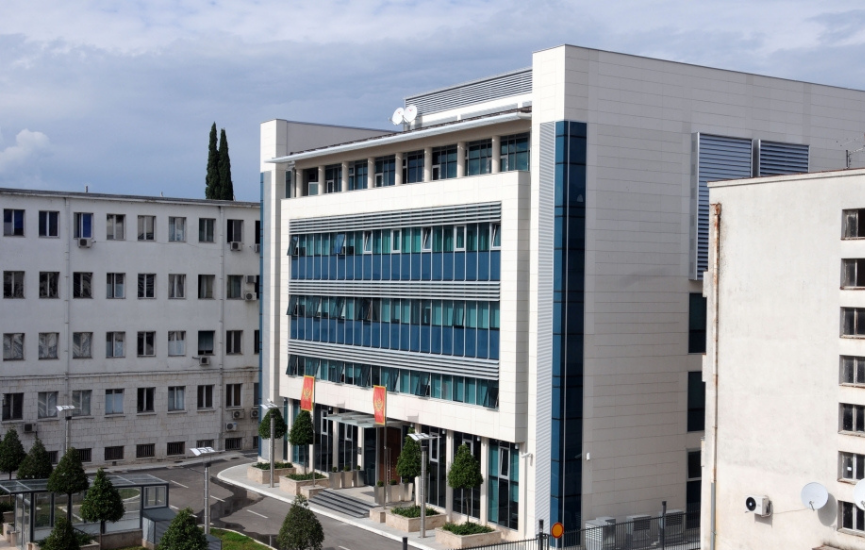Policy Recommendations
- The government should develop precise roadmaps in the EU accession talks and a clear framework for strengthening the rule of law. The measures should include better defined indicators and activities while insisting on more specific tasks on an annual basis within the interim benchmarks to facilitate both performance assessment and monitoring of progress. A new model of reporting based on a simplified form, which would include an overview of key challenges in meeting the benchmarks and thus strengthening the rule of law, would be advisable as well.
- The new parliamentary majority and all parties in the parliament should strive to remove political influence from the judiciary and find solutions that will enable the strengthening of institutions and ensuring their impartiality. As the EU insists on a broad consensus on these issues, and society is in a state of deep polarisation, a kind of mediation between the two blocs, the majority and the opposition, is needed. In this way, the selection of the best candidates in the judiciary, especially where envisaged membership of the academy (civil society), which will not be close to any party, and thus impartial law enforcement will be ensured and politicisation avoided.
- The government should fully open the reforms to the public to allow public scrutiny and impartial evaluation.
Abstract
Although it has been negotiating EU membership for more than nine years and thus carrying out certain activities to strengthen the rule of law under the umbrella of EU conditionality, Montenegro continues to struggle with pervasive corruption and politicised institutions. While it managed to overthrow the 30-year-old regime in August 2020, which was the main cause of the elements of the captured state that the European Commission recognised in its 2018 Strategy, it is unclear to what extent the new government is able to deal with burning issues. This is predominantly due to the composition of parties/coalitions that are now part of the parliamentary majority, which cannot reach the necessary consensus on important subjects to strengthen the rule of law. The main obstacle in this direction is the situation in the judiciary, which is still strongly influenced by the previous government, while the new majority does not have enough knowledge, experience and capacity to swiftly make the much-needed departure from undemocratic practices. An additional problem is growing nationalism and deep polarisation in society, so the two blocs, instead of getting closer for the benefit of citizens and rapid democratisation, are blocking further progress. Although it has adopted a new enlargement methodology, Montenegro is slowly adjusting its structure and directing available capacities towards its implementation.
****************************
The rule of law in Montenegro between deep polarisation and an unstable majority – how to get back on track?
Context
The new 42nd Montenegrin Government was elected in the parliament on 4 December 2020 after the 30-year-long period of the same party’s participation, the Democratic Party of Socialists (DPS), in the executive branch. The unstable support in the parliament, since out of 41 members of parliament/deputies who are now part of the new majority,[1] many of them, i.e. their parties, only conditionally supported the new government, and from the very beginning they were its harshest critics, alongside with the composition of the new parliamentary majority, with several parties from the extreme right to parties with a civic orientation, are the reasons why it is difficult to predict how stable the new government will be and to what extent it will be able to cope with growing economic problems, nationalism, widespread corruption, and organised crime in the country.
It was clear from the very beginning that the new government would not have an easy task as regards democratisation and strengthening the rule of law, given the situation in the country and widespread corruption and organised crime while other branches, such as the judiciary, are not depoliticised.
The fight against corruption and organised crime is at the centre of the activities and priorities of the new government, at least in terms of declarative statements and revealed cases. During this first period, many irregularities and wrongdoings of the previous government were exposed, and they were accompanied by the arrests of the former director of the Investment and Development Fund for distribution of funds in the form of agricultural loans from the Abu Dhabi Fund for Development.[2] However, these, as in many other cases of arrests, were only informative talks in the prosecution, and it remains to be seen in which direction the investigations will go. The National Council for the Fight against Corruption[3] was established on the initiative of the Deputy Prime Minister with two prominent representatives of civil society were included in its composition. However, this again raised the question of whether Montenegro needs new bodies when it has already reformed its institutional framework for fighting corruption and organised crime.
Yet, for a decisive fight against corruption and organised crime much more would be needed.
The initial steps of the new government do not encourage or give reason for optimism that in the coming period we will have a strong departure from nepotism and clientelism while we have witnessed many confusing and controversial moves. What still gives reason for optimism is that there is the political will to prosecute and reveal all the illegalities of the previous government. Yet, for a decisive fight against corruption and organised crime much more would be needed.
The framework offered by the EU – is it sufficient to strengthen the rule of law?
The negotiation process with the European Union (EU) has been stagnating for several years. Although Montenegro opened the last negotiating chapter in June 2020, one cannot talk about any progress in the process in recent years. Even though strengthening the rule of law remains the major precondition for closing the negotiations, the situation in the chapters related to the rule of law is still far from satisfactory.
In response, the government has prepared new dynamic plans, but it is still unclear to what extent they can respond to the many challenges that stand in the way of strengthening the rule of law in the country.
In accordance with the new enlargement methodology, presented by the European Commission in February and accepted by the government in May 2020, the negotiation process depends, as before, on meeting interim benchmarks. These benchmarks were defined eight years ago and have so far proved to be broad and do not provide clear guidelines for improving the rule of law. In addition, in order to respond to them, Montenegro has prepared action plans for Chapters 23 (Judiciary and Fundamental Rights) and 24 (Justice, Freedom and Security), which have been updated only once so far, in 2015, and as such are outdated, with poor defined indicators, and are not a good basis for making a turnaround and providing measurable results. In response, the government has prepared new dynamic plans, but it is still unclear to what extent they can respond to the many challenges that stand in the way of strengthening the rule of law in the country. According to the new methodology, there is no progress in the negotiations until the results are provided in the first fundamentals’ cluster, which includes Chapters 23 and 24.
The European Commission assessment once again confirmed how serious the tasks before Montenegro are on the road to the EU and how little has been done to strengthen the rule of law, even though the state has been negotiating for more than nine years.
What the European Commission points out in its latest non-paper, a document representing the assessment of the situation in Chapters 23 and 24, is that it is not only focusing on fulfilling the activities from the action plans for Chapters 23 and 24, but also on international obligations. The European Commission assessment once again confirmed how serious the tasks before Montenegro are on the road to the EU and how little has been done to strengthen the rule of law, even though the state has been negotiating for more than nine years. The fulfilment of the obligations is hampered by various problems that the European Commission repeats from year to year in all its documents, such as lack of money laundering verdicts, the manner of applying the plea agreement, and the functioning of the Anti-Corruption Agency.
How to ensure independent institutions?
When it comes to the necessary changes in the judiciary, appointments to some key positions so far have required a two-thirds majority in the parliament, which couldn’t be achieved in conditions of deep polarisation. In the last non-paper, the European Commission highlights the role and position of the Special State Prosecutor’s Office (SDT), and the importance of the Venice Commission’s[4] opinion, while avoiding commenting on the newly adopted amendments to the Law on the State Prosecution. It is repeated what is expected but not whether the changes are the basis for such a thing, which leaves a lot of room for arbitrary interpretations. In fact, in the last European Commission’s country report it is stated that ‘the May 2021 amendments to the Law on the State Prosecution Service, which entered into force in June 2021, failed to fully address the Venice Commission’s recommendations concerning risks of politicisation of the Prosecutorial Council’.[5]
An additional obstacle, as pointed out at the outset, is the composition of the parliamentary majority, which so far has not proven to be able to reach agreement on important issues.
Amendments to the Law on the State Prosecution, which were adopted in May 2021, imply that the Prosecutorial Council, which is responsible for electing the Special State Prosecutor and other prosecutors, is elected by a simple (41 out of 81 deputies) instead of the two-thirds majority. In this way, the election of the Prosecutorial Council is possible only by the votes of the parliamentary majority, which is the main subject of criticism. Another important novelty in relation to this Council refers to its composition and now it is planned to consist of five representatives of the prosecutor’s office and another five from the academy (civil society in general), along with a representative of the Ministry of Justice, who, in this case, is on the side of the parliamentary majority. Hence, many interested parties criticise that this is a placing of the Prosecutor’s Office under the control of the new government. The position of the Venice Commission is that the election of the Prosecutorial Council by a simple majority in the parliament cannot ensure its impartiality.
An additional obstacle, as pointed out at the outset, is the composition of the parliamentary majority, which so far has not proven to be able to reach agreement on important issues. This turned out to be an issue in implementing the new solutions, as the three coalitions that make up the parliamentary majority could not agree on a list of candidates for the Prosecutorial Council at the end of July. The whole process was accompanied by strong pressure from the EU and Germany not to make the choice hastily and to ensure a broad consensus.
As for other solutions, the Venice Commission also pointed to the controversial manner of electing the acting Supreme State Prosecutor and recommended that the person should be elected from the active prosecutors, again pointing to the need to find a broad consensus among all political parties. In addition, the Supreme State Prosecutor’s position has been in the acting position for a long time due to the impossibility of securing a two-thirds majority on his/her election to parliament.
Civil society and transparency – is it time to make a real impact on policymaking?
With the change of government in December 2020, there have been significant gaps in the formal adherence to procedures for involving civil society in policy making.
Civil society involvement in policy making has in the previous period been significantly improved by the procedures for participation in working groups for drafting laws, but also by prescribing mandatory public hearings/debates. However, although formally involved, essentially the role of civil society was marginalised by the previous government, as most of their proposals were rejected without clear justification, which the European Commission itself recognised in its reports calling for an evaluation of their proposals in a meaningful way. With the change of government in December 2020, there have been significant gaps in the formal adherence to procedures for involving civil society in policy making. Already during the first month of its mandate, the government failed to hold public hearings/debates on important laws such as the controversial Law on Freedom of Religion, which was the subject of protests for months last year, or amendments to the Law on Civil Servants and State Employees, which significantly reduced employment criteria, problematic from the aspect of public administration reform and merit-based approach to employment. In this way, the door is open for less experienced individuals to take certain positions in public administration. The same applies to the first phase of work on amendments to the Law on the State Prosecution, while in the second phase civil society was involved selectively, and the public debate was shortened. In addition, the government, although announced by political parties during the election campaign, is lagging behind in publishing documents that were classified as internal during the previous government, while some important negotiations, such as negotiations with the Serbian Orthodox Church (SOC) on the Basic Agreement, taking place behind the eyes of the public.
In this way, the door is open for less experienced individuals to take certain positions in public administration.
Although some of these might be justified by the inexperience, this trend should not be continued, as due to the integration phase in which Montenegro finds itself, but also the extremely important tasks facing it, the inclusion of all available capacities and external expertise, support and control are more than needed along the way. This implies not only formal compliance with procedures for involving civil society, but also substantial consideration of received proposals, strengthening of communication channels, and joint campaigns that will inform citizens about the mechanisms at their disposal for the control of executive branch. Given that representatives of civil society in Montenegro are directly involved in the negotiating working groups with the EU, significant support can be provided in defining guidelines for the application of the new enlargement methodology and especially in defining new measures and activities related to strengthening the rule of law, as well as indicators based on which their fulfilment will be measured.
Photo: Parliament building, Podgorica (2012) / By Rasho – Own work, CC BY-SA 3.0, https://commons.wikimedia.org/w/index.php?curid=18123128
****************************



[1] The new government was supported in the parliament by the For the Future of Montenegro (27 seats), a conservative populist coalition headed by Democratic Front (DF), Peace is Our Nation (10 seats) led by centrist Democrats, and moderate Black on White (4 seats) led by the moderate social-liberal and green civic movement URA (United Reform Action).
[2] “Former director of the IRF, Zoran Vukčević, was arrested“, RTCG, 4 February 2021, http://www.rtcg.me/vijesti/hronika/309016/uhapsen-bivsi-direktor-irf-a-zoran-vukcevic.html
[3] “National Anti-Corruption Council established”, the Government of Montenegro, 27 January 2021, https://www.gov.me/naslovna/Savjetodavna_tijela/Nacionalni_savjet_za_borbu_protiv_korupcije_na_vis/237869/Odluka-o-izboru-kandidata-predstavnika-NVO-za-clana-icu-Nacionalnog-savjeta-za-borbu-protiv-korupcije-na-visokom-nivou.html
[4] The European Commission for Democracy through Law – better known as the Venice Commission as it meets in Venice – is the Council of Europe’s advisory body on constitutional matters. https://venice.coe.int
[5] Montenegro 2021 Country Report, European Commission, October 2021, p. 18, https://ec.europa.eu/neighbourhood-enlargement/montenegro-report-2021_en
About the article
ISSN 2305-2635
The views expressed in this publication are those of the author and not necessarily those of the Austrian Society of European Politics or the organisation for which the author is working.
Keywords
Montenegro, benchmarking, judiciary, corruption, transparency, European Union
Citation
Mumin, N. (2021). The rule of law in Montenegro between deep polarisation and an unstable majority – how to get back on track? Vienna. ÖGfE Policy Brief, 23’2021







